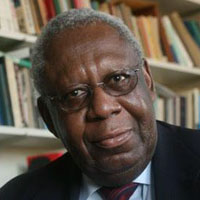Symposium to explore the African-American experience along the Peninsula
The William & Mary Lemon Project will host its third annual spring symposium March 15-16, focusing on the theme of “Campus & Communities: The African-American Experience Along the Peninsula.”
The annual event will take place at Bruton Heights School on Friday and the W&M School of Education on Saturday, and will include presentations and panel discussions on a range of topics, from Civil War-era slavery to modern multi-racial discourse. The event is free and open to the public, but registration is required.
 The W&M Board of Visitors established the Lemon Project
in 2009 in order to explore the university's history with slavery and its
continued relationship with the African-American community through the Jim Crow
period and into modern times. Since its inception, the project has sponsored
classes, research projects and a number of events, including the annual spring
symposium. The organizers of the Lemon Project have dedicated this year’s
symposium, as well as the rest of their 2013 events, to the memory of Bob Engs,
a former visiting professor of history who passed away in January.
Engs’ work led to the establishment of the Lemon Project.
The W&M Board of Visitors established the Lemon Project
in 2009 in order to explore the university's history with slavery and its
continued relationship with the African-American community through the Jim Crow
period and into modern times. Since its inception, the project has sponsored
classes, research projects and a number of events, including the annual spring
symposium. The organizers of the Lemon Project have dedicated this year’s
symposium, as well as the rest of their 2013 events, to the memory of Bob Engs,
a former visiting professor of history who passed away in January.
Engs’ work led to the establishment of the Lemon Project.
“Once again, I am looking forward to the symposium,” said Jody Allen, Lemon Project coordinator and adjunct visiting assistant professor. “I am excited about the research that will be presented and anticipating a lively exchange of ideas between the audience and panelists. Of course, this year will be bittersweet for us all because of the absence of Bob Engs.”
For the first time, this year’s symposium will begin on Friday night at 6 p.m. at the Bruton Heights School with a dramatic historical interpretation. The session, titled “Flight to Freedom: The Fields Family and Freedom's Fortress,” will focus on the story of James A. Fields, who escaped enslavement in Hanover County, Va., finding sanctuary at Fort Monroe in Hampton. Fields later went on to become a lawyer, graduating from the Howard University School of Law. Historical interpreter Ajena Rogers, a descendant of Fields, is expected to attend the event, along with genealogical researcher Drusilla Pair. The presentation is being held in recognition of the 150th anniversary of the signing of the Emancipation Proclamation.
Saturday’s portion of the symposium, to be held in the W&M School of Education, begins with check-in and breakfast from 8 a.m. to 8:45 a.m. followed by opening remarks by Allen and Kate Slevin, vice provost for academic affairs.
At 9:15 a.m., Bonnie Winston, communications manager with the W&M Office of University Development, will moderate a panel entitled, “William & Mary: Then and Now.” The panelists will include a current student, former student, current staff member and community member.
W&M President Taylor Reveley will speak to the attendees at 10:50 a.m., right before four concurrent panel sessions begin at 11.
The first of those sessions will include the following topics:
- “Speaking of the Past: Oral Histories of African Americans at the College of William & Mary,” presented by Sarah McLennan, Lemon Project fellow and a Ph.D. candidate in history at W&M
- “Make the Ground Talk: Bringing to Life the Vanished African American Communities of Virginia’s Tidewater Through Personal Stories, A Video Documentary in Progress,” presented by community members Erin Holloway and Erin Palmer
- “‘You Can't Erase Our Memories: The Building of, the Demolition of, and the Preservation of Fulton,” presented by Caroline Morris, adjunct assistant professor at Randolph-Macon College
Session two will focus on the following:
- “Affirmative Action and the Conceptualization of Diversity at the College of William and Mary,” presented by W&M student Ashleigh Ramos ’13
- “‘So, How Should We Talk About This?:’ Examining Multi-Racial Discourse in the Post-Obama Era,” presented by Andrew Ojeda ’12, master’s degree student at New York University
The third session, moderated by Terry Meyers, chancellor professor of English and co-chair of the Lemon Project, will focus on the following:
- “What Could Jupiter Learn at William & Mary that He Didn’t Already Know?” presented by Susan Kern, visiting associate professor of history at W&M
- “Exhibiting Slavery: How Plantation Museums in Virginia Represent Slavery,” presented by W&M student Jill Found ’13
- “The Bray School Archaeological Project: A Report on the First Season of Excavation,” presented by Mark Kostro, Ph.D. candidate in anthropology at W&M
The fourth session will include the following topics:
- “No Silver Spoon: Maggie L. Walker and Black Resilience” and “12 Boxes Later: Maggie Walker & Blacks during the Great Depression,” presented by Heather Huyck, research associate for the W&M Department of History
- “Black Community, Black Business & Black Family: Maggie Walker and the Independent Order of St. Luke,” presented by W&M student Jade Mason ’15
- “Ticket to Freedom: Maggie Walker and Blacks Voting,” presented by W&M student Kameron Melton ’15
The symposium will end with a lunch served from 1 to 2 p.m., during which a general discussion about the Lemon Project will be held.














